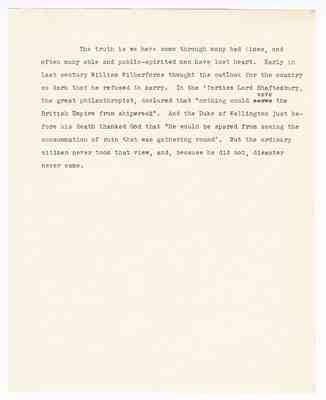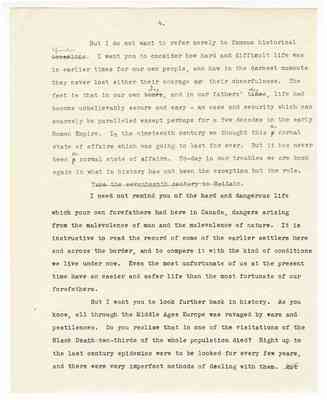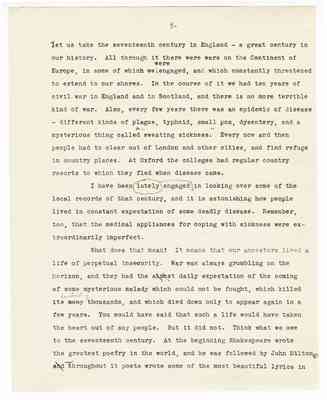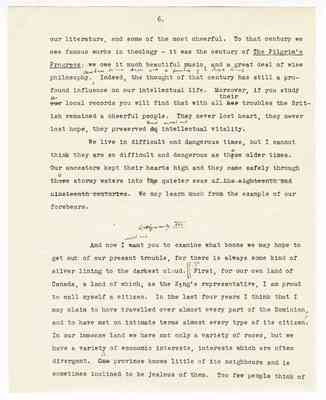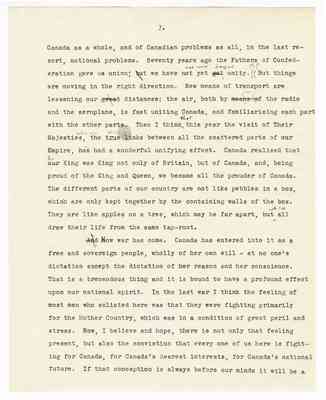Pages
page_0006
The truth is we have come through many bad times, and often many able and public-spirited men have lost heart. Early in last century William Wilberforce thought the outlook for the country so dark that he refused to marry. In the 'forties Lord Shaftesbury, the great philanthropist, declared that "nothing could save the British Empire from shipwreck". And the Duke of Wellington just before his death thanked God that "he would be spared from seeing the consummation of ruin that was gathering round". But the ordinary citizen never took that view, and, because he did not, disaster never came.
page_0007
4.
But I do not want to refer merely to famous historical episodes. I want you to consider how hard and difficult life was in earlier times for our own people, and how in the darkest moments they never lost either their courage or their cheerfulness. The fact is that in our own day, and in our fathers' day, life had become unbelievably secure and easy - an ease and security which can scarcely be paralleled except perhaps for a few decades in the early Roman Empire. In the nineteenth century we thought this the normal state of affairs which was going to last for ever. But it has never been the normal state of affairs. Today in our troubles we are back again in what in history has not been the exception but the rule.
I need not remind you of the hard and dangerous life which your own forefathers had here in Canada, dangers arising from the malevolence of man and the malevolence of nature.
It is instructive to read the record of some of the earlier settlers here and across the border, and to compare it with the kind of conditions we live under now. Even the most unfortunate of us at the present time have an easier and safer life than the most fortunate of our forefathers.
But I want you to look further back in history. As you know, all through the Middle Ages Europe was ravaged by wars and pestilences. Do you realise that in one of the visitations of the Black Death two-thirds of the whole population died? Right up to the last century epidemics were to be looked for every few years, and there were very imperfect methods of dealing with them.
page_0008
5.
Let us take the seventeenth century in England - a great century in our history. All through it there were wars on the Continent of Europe, in some of which we were engaged, and which constantly threatened to extend to our shores. In the course of it we had ten years of civil war in England and in Scotland, and there is no more terrible kind of war. Also, every few years there was an epidemic of disease - different kinds of plague, typhoid, small pox, dysentery, and a mysterious thing called the "sweating sickness". Every now and then people had to clear out of London and other cities, and find refuge in country places. At Oxford the colleges had regular country resorts to which they fled when disease came.
I have engaged lately in looking over some of the local records of that century, and it is astonishing how people lived in constant expectation of some deadly disease. Remember, too, that the medical appliances for coping with sickness were extraordinarily imperfect.
What does that mean? It means that our ancestors lived a life of perpetual insecurity. War was always grumbling on the horizon, and they had the daily expectation of the coming of some mysterious malady which could not be fought, which killed its hundreds of thouands, and which died down only to appear again in a few years. You would have said that such a life would have taken the heart out of any people. But it did not. Think what we owe to the seventeenth century. At the beginning Shakespeare wrote the greatest poetry in the world, and he was followed by John Milton. Throughout it poets wrote some of the most beautiful lyrics in
page_0009
6.
our literature, and some of the most cheerful. To that century we owe famous works in theology- it was the century of The Pilgrim's Progress; we owe it much beautiful music, and a great deal of wise philosophy. Modern science began with a founding of the Royal Society. Indeed, the thought of that century has still a profound influence on our intellectual life. Moreover, if you study the local records you will find that with all their troubles the British remained a cheerful people. They never lost heart, they never lost hope, they preserved their moral and intellectual vitality.
We live in difficult and dangerous times, but I cannot think they are so difficult and dangerous as those older times. Our ancestors kept their hearts high and they came safely through those stormy waters into quieter seas. We may learn much from the example of our forebears.
III
And now I would ask you to examine what boons we may hope to get out of our present trouble, for there is always some kind of silver lining to the darkest cloud.
First, for our own land of Canada, a land of which, as the King's representative, I am proud to call myself a citizen. In the last four years I think that I may claim to have travelled over almost every part of the Dominion, and to have met on intimate terms almost every type of its citizens. In our immense land we have not only a variety of races, but we have a variety of economic interests, interests which are often divergent. A province knows little of its neighbours and is sometimes inclined to be jealous of them. Too few people think of
page_0010
7·
Canada as a whole, and of Canadian problems as all, in the last resort, national problems. Seventy years ago the Fathers of Confederation gave us union; we have not yet achieved perfect unity.
But things are moving in the right direction. New means of transport are lessening our distances; the air, both by the radio and the aeroplane, is fast uniting Canada, and familiarising each part with the other parts. Then I think that this year the visit of Their Majesties, who are the chief links between all the scattered parts of our Empire, has had a wonderful unifying effect. Canada realised that the King was King not only of Britain, but of Canada, and, being proud of the King and Queen, we became all the prouder of Canada. The different parts of our country are not like pebbles in a box, which are only kept together by the containing walls of the box. They are like apples on a tree, which may be far apart, but which all draw their life from the same tap-root.
Now war has come. Canada has entered into it as a free and sovereign people, wholly of her own will- at no one's dictation except the dictation of her reason and her conscience. That is a tremendous thing and it is bound to have a profound effect upon our national spirit. In the last war I think the feeling of most men who enlisted here was that they were fighting primarily for the Mother Country, which was in a condition of great peril and stress. Now, I believe and hope, there is not only that feeling present, but also the conviction that every one of us here is fighting for Canada, for Canada's dearest interests, for Canada's national future. If that conception is always before our minds it will be a
